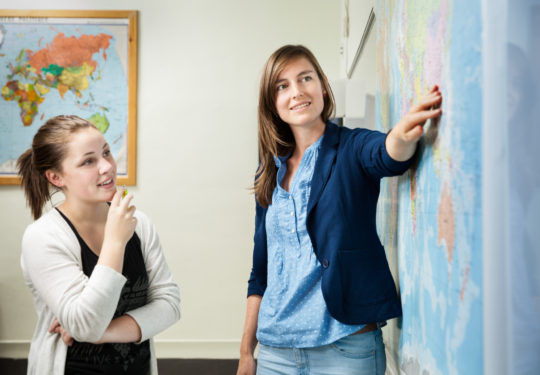Social Science, Administration and Mathematics
- Diploma : Pre-University
- Duration : 2 years
- Quota : No
- Program Code : 300.3a
Program with the possibility of a $15,000 scholarship: Learn more
Program description
You are interested in learning more about the world, societies, and human relations? Then consider the History, Geography, Psychology, Political Science, Sociology, and Economics courses to explore the issues affecting humans with the support of a dynamic team! Also acquire the knowledge you need to pursue university studies in the field of management or administration.
Choosing to Study Here
- Become involved in research experiences that give you a chance to put into practice what you are learning and make the most of your intellectual energy.
Take part in meaningful field trips that stimulate authentic learning.
Become involved in a humanistic educational project that helps you build psychosocial aptitudes.
Build language skills to be able to communicate better verbally and in writing.
Second Language Immersion
As this program is also offered in French, some courses can be taken as part of French immersion.
Adventure-Studies
Integrate one weekly outdoor activity and four weekend outdoor activities per semester, including a more extensive end-of-year outing, with the Adventure-Studies option.
Your University Studies
The fields available to you with a DEC in Social Science are:
- Administration and Management (Human Resources Management, Business Administration, Accounting, etc.);
- Social Science (Political Science, Economics, History, Geography, Philosophy, Sociology, Criminology, Law);
- Communications (Communications, Journalism, Public Relations, Cinema, Television);
- Education (Pre-school, Primary school and Secondary school teaching, Special Education);
- Intervention (Psychology, Educational and Counselling Psychology, Social Work, Vocational and Career Counselling, Sexology, Industrial Relations); and
- Many other fields.
Course Schedule
You can take a maximum of 3 specific training courses in the same discipline (ex. : geography, psychology, sociology, history politics, economics) during the duration of the program, including the mandatory introductory course.
First Semester
28 hours/weekAcademic Work Methods in Social Science 300-303-GA
Description to come.
Introduction to World History Since the 15th Century 330-304-GA
Description to come.
Introduction to Psychology 350-333-GA
This course aims to introduce students to the scientific basis for the study of human behaviour and the underlying mental processes. It also seeks to develop an awareness of the interaction of factors that influence the overall functioning of individuals. The course provides an exploration of the fundamental theoretical principles that will serve as a foundation for further exploration of different areas of psychology.
The knowledge of these basic notions will contribute to the formation of scientific thinking through which students will develop improved critical thinking skills, enabling them to distinguish between popular and scientific psychology.
By the end of this course, students will be able to explain patterns of human behaviour and mental processes from a psychological perspective.
Initiation à l'organisation de l'entreprise (offert en français) 401-313-GA
Ce cours vous présentera la discipline de l’administration. Vous y aborderez les fonctions internes du marketing, de la finance, de la gestion des ressources humaines, de la gestion de la production et de la comptabilité à travers le processus administratif. Grâce à cette initiation, vous développerez une vision administrative de certaines décisions d’entreprise.
Differential Calculus for Social Science 201-SH2-RE
This course will teach you to apply the methods of differential calculus to the study of functions and to solve problems. You will be able to recognize and describe the characteristics of a function, determine if it has a limit, is continuous, is derivable, at a point and on an interval. You will also learn to apply the rules and techniques of derivation, to use the derivative and related concepts to analyze the variations of a function and to draw its graph. You will be able to solve optimization and rate of change problems. From the beginning to the end of this course, various applications in Social Science will be emphasized.
Physical Activity and Health 109-101-MQ
This course focuses on the relationship between physical fitness, healthy, and active lifestyle and health. You will have to experiment with one or a few physical activities and relate them to your ability to adapt to exercise, your needs to change or maintain your physical condition, your motivation, your lifestyle habits, and your knowledge regarding prevention, in order to make a relevant and justified choice of physical activities.
Introduction to College English 603-101-MQ
Introduction to College English is designed to help students make the transition from high school English courses and to improve their writing and analytical skills necessary for college English. This course serves as the basis to the organizational and interpretative skills required in the other three courses of English.
One aim of the course is to explore works of literature in detail and, on a cultural level, attempt to find their relationship to our world and our lives. Students are encouraged to read and respond to literature on both a literal and metaphorical level. Students will be reading short stories and examining the literary elements necessary to critical thinking and analysis. This proficiency in the literary elements allows students to take a concrete approach to literary analysis and these skills will continue to be developed in the other two literature courses.
The second goal of the course is to learn to organize ideas, in the form of a formal essay, to develop a focused thesis statement, to write in a coherent and organized style, and support arguments and explanations with appropriate references to the literary text. To achieve these goals students will be required to adopt a writing process wherein they outline their essay, write a rough draft, and proofread and edit their work. To this end, the course will emphasize practical written work including grammar exercises and editing skills. As well, students are encouraged to develop their reading comprehension skills, to present their ideas in class discussions, and to continue to improve their writing style.
Knowledge 345-101-MQ
The course Knowledge is about revealing our sources of knowledge. By referring back to the history of ideas, we can better understand how we know what we think we know and how to criticize what we think we know intelligently, thoughtfully, and efficiently. After studying the material throughout the course, students should be able to answer the following questions: How is knowledge acquired? Can we know anything? What can we know?
Second Semester
19 hours/weekQualitative Research ans Methods in Social Science 300-222-RE
This course will introduce you to research in Social Science, where you will develop the core skills necessary to carry out qualitative research in this field.
Through teamwork, you will experience all the stages of qualitative research in the social sciences: selection of a topic, development of a problem, use of a qualitative data collection method, data analysis, interpretation of findings and communication of research results.
This course is also an opportunity to learn more about teamwork (communication, respecting one’s limits and those of others, different ways of working, etc.)
Choice of 1 out of 2 Click here to see
320-323-GA, Introduction to Geography
This introductory course to world geography aims at imparting knowledge and understanding of the world using various thematic maps and a synthesis of different approaches in physical and human geography. We will study geographical notions as various as the place of the Earth in the universe or territorial occupation.
The course is based on a perspective which allows us to understand the human relationships that are forged with space and territory at various scales. The study of the natural and cultural components of the geosphere, along with the analysis of their challenges and solutions, lead students to reflect tangiblyon the society and the environment in which they play a part.
The course also aims to introduce students to the geographical method by initiating them to the analysis and synthesis of geographical sources, while providing the opportunity to work, among other things, on developing their ability to formulate a geographical commentary.
385-323-GA, Political Science: Québec and Canada
This introductory course in political science focuses more precisely on Quebec and Canadian political realities while establishing links with other realities.
This way, you will learn to address the main foundations of political life in today’s society. Among other things, topics covered in this course will include currents of political thought, political institutions and their functioning, and prevailing political issues, all in a spirit of openness and inclusion.
The course also aims to develop your curiosity and interest in our political system as well as to provide you with the knowledge and tools to better understand it.Choice of 1 out of 2 Click here to see
401-353-GA, Initiation au marketing (offert en français)
Ce cours vous fera connaître les aspects généraux du domaine du marketing, tels que les variables qui influencent l’entreprise, le marché cible et la segmentation de ce marché, le cycle de vie d’un produit, la publicité, et plus encore. Il vous initiera aussi aux éléments de base d’un plan marketing, qui vous aideront à prendre des décisions concernant un produit, son prix, sa distribution et sa promotion.
401-363-GA, Initiation au droit (offert en français)
Ce cours vous apprendra à reconnaître et à appliquer les règles de droit relatives au monde des affaires. Vous acquerrez une vue d’ensemble de l’environnement juridique dans lequel individus, entreprises, employeurs et salariés évoluent, notamment en ce qui concerne les obligations, les contrats et les documents propres au domaine des affaires.
Physical Activity and Effectiveness 109-102-MQ
This course is about the process of improving effectiveness through an objective-based approach in the context of a sport, expression, or outdoor activity. You will need to take an initial survey and assess your skills and behaviors regarding the practice of physical activity, set goals and interpret your progress to improve. This course aims to empower you by taking charge of your apprenticeships required for your improvement in the practice of physical activity.
Literary Genres 603-102-MQ
This course is designed to provide students with a broad perspective of the literary genres selected from different periods of literature. It will examine three literary genres chosen from drama, essay, novel, or poetry, so that students gain an appreciation for different genres of literature. The characteristics of each genre will be highlighted, and students will develop their interpretation skills by recognizing the importance of specific literary conventions in each text. Students will then present their analysis in well-organized literary essays and oral presentations.
Elective course 1 COM-001-03
Description to come.
Third Semester
28-29 hours/weekQuantitative Analysis in Social Science 350-223-RE
This course introduces you to the methods of statistical analysis of quantitative data, consistent with the scientific approach. In addition to examining facts from a qualitative perspective, most social science disciplines use quantitative data analysis to characterize human phenomena. To obtain reliable information, data must be collected, processed and presented adequately. This course will teach you how to draw accurate conclusions from statistical data and to identify inconsistent, approximate or flimsy analyses.
Introduction to Economics 383-313-GA
This course introduces the fundamental concepts of economics by exploring various schools of thought, key macroeconomic indicators, and the mechanisms and institutions found in a mixed and open economy.
The primary aim will be to explain the economic principles that guide optimal resource allocation, shaping both individual and collective choices. Additionally, students will acquire a specialized economic vocabulary, develop skills to interpret quantitative data and cultivate a critical perspective on contemporary economic issues.
Choice of 1 out of 2 Click here to see
383-333-GA, Political Regimes ans Ideologies
This course is designed to familiarize students with political ideologies and the political regimes in which they operate. While classical ideologies (liberalism, social democracy, conservatism, fascism, nationalism, socialism, etc.) are covered, more recent ideologies (religious fundamentalism, anarchism, libertarianism, feminism, ecologism, etc.) will also be discussed. By learning about both ideologies and political regimes, you will also be able to establish links between these and political headlines.
320-333-GA, Geographical Observatory: Territorial Encounters
This course is designed to help students recognize and understand geographical issues in an applied context (e.g., field study or survey, cultural trip, study tour, immersion or cooperation project, etc.). Territorial encounters – in situ activities – are at the heart of this course, making the human realities of the issues dealt with tangible. To address the complexity of some of these issues, these realities can be explored from both a disciplinary (geographical science) and a multidisciplinary angle. This decompartmentalization allows for a more accurate synthesis of such realities while enabling a multitude of viewpoints to be considered.
In addition to the acquisition of knowledge, particular attention will be devoted to the skills (know-how) and attitudes (life skills) to be acquired and adopted in the contexts of observation or immersion in the field.
Choice of 2 out of 4 Click here to see
201-SH4-RE, Linear Algebra and Vectorial Geometry
The course will teach you to apply the methods of linear algebra and vector geometry to problem–solving in Social Science. It will allow you to translate concrete problems into linear equations and to solve systems of linear equations using matrix methods. You will learn how to make connections between geometry and algebra, establish the equation of geometric locations (lines and planes), determine their intersections and calculate angles, lengths, areas, and volumes. You will also be taught how to construct representations of geometric locations in a plane and in space, as well as to solve linear programming problems using representations and matrix manipulations. In this course, an important emphasis will be put on applications in Social Science.
Contemporary Themes : A Multidisciplinary Perspective
This course provides an opportunity for students to gain a unique perspective on the world around them, by reflecting on and analyzing contemporary issues through the lens of various social science disciplines. To that end, students will draw on what they have learned in other multidisciplinary courses in the Social Science program (e.g. Academic Work Methods in Social Science and Qualitative Analysis in Social Science), as well as what they have acquired in the economics, geography, history, psychology, sociology and political science courses. The insights provided by the various disciplines of social science on a given issue open up particularly enriching possibilities for understanding, challenging one’s way of looking at things.
401-373-GA, Comptabilité (offert en français)
Ce cours vous permettra de faire l’analyse de la situation financière d’une entreprise. Ainsi, il vous initiera à la collecte et à l’analyse de l’information comptable, à l’enregistrement des transactions financières et à la présentation des états financiers.
387-353-GA, Intimacy and Sexuality: A Sociological Insight
Description to come.
World Views 345-102-MQ
This course allows the student the opportunity to apply the critical thinking skills they have acquired in Knowledge to various world views. The course also provides the student with a profound understanding of human beings and human nature by examining various ideologies of individuals, societies, or groups.
Literary Themes 603-103-MQ
Description to come.
French Second Language Common 602-1XX-MQ
The focus of these courses is to improve students’ ability to communicate in French through their daily outings and to better understand the language. The students will be developing their writing, speaking, listening and speaking skills while working on different projects.
Physical Activity and Autonomy 109-103-MQ
This course is designed to help you integrate physical activity into your lifestyle, including better management of the factors that facilitate this integration. During the supervised practice, you will apply the previous apprenticeships by practicing physical activity regularly and sufficiently from a health perspective, on the one hand, and by planning, carrying out and evaluating a personal physical activity program that you have the opportunity to practice and validate under the supervision of the teaching staff, on the other.
Fourth Semester
22 hours/weekIntegration of Learning 300-313-GA
This course offers students the opportunity to revisit all the knowledge gained and skills achieved during their time in the Social Science program and to apply them in a new setting as part of a conscious, learning integration process.
This is a multidisciplinary course where students are required to apply their acquired knowledge, critically reflect on their career in the Social Sciences, and mobilize and integrate what they have learned to realize a large-scale project.
This course emphasizes both independent and collaborative work.
Choice of 2 out of 5 Click to view them
Globalization ans Economic Issues, 383-323-GA
Driven by the spread of economic liberalism and the removal of trade barriers, economic globalization has accelerated. While this global market integration has brought many benefits, it has also created significant challenges, including achieving sustainable growth in the face of the climate crisis, the loss of economic boundaries, vulnerabilities in supply chains, the growing influence of multinational corporations, and rising trade conflicts.
This course introduces students to the economics of globalization, exploring the origins, mechanisms, and impacts of international economic relations. It is designed to equip students with an understanding of how the global economy functions while encouraging critical analysis of key contemporary issues. To provide a deeper understanding and offer practical insights as well as real-world applications, the course includes case studies on the economic approaches of various countries.
Applied Statistics in Social Science, 201-SH5-RE
This course follows on from Qualitative Analysis in Social Science and completes the student’s knowledge in data analysis. Using probabilities, you will learn to solve current problems in Social Science and become familiar with probability bases, combinatory analysis and most frequently used probability distributions. The course will teach you how to apply statistical inference for an in-depth data analysis in Social Science research. You will learn to accurately estimate Social Science research parameters and make rigorous decisions with hypothesis testing.
Culture and Media, 387-363-GA
In our information and technological era, this final sociology course will lead the group to examine the different relationships that can exist between culture and the media. As our social and cultural universe is profoundly marked by technological developments and the expansion of mass media, multiple issues and themes can be addressed: media convergence and concentration, cultural diversification and homogenization, social polarization, social representation of minorities and various social groups, etc. Students will notably be brought to analyze current topics covered in the news.
History Through Film, 330-313-GA
This course will look not only at the films that have shaped the history of cinema, but also at the cinematographic content itself, to better understand the different eras in which these films were produced.. In this sense, it will serve as a historical source. Finally, historical cinema, by producing culture, influences history, whether as a means of propaganda or counter-power. The course will therefore be an opportunity to approach cinema as a generator of historical phenomena.
Interpersonal Relationships, 350-373-GA
Offered in the fourth semester of the Social Science program, this course provides an in-depth look at human relationships through psychological concepts and theories. It examines the characteristics of interpersonal relationships, the mechanisms of communication, both the obstacles to and facilitators of relationships, as well as the impacts of these dynamics on our interactions.
The course also includes practical activities designed to develop and refine communication skills. These exercises aim to encourage personal reflection on ways of interacting with others while providing tools to enhance the quality of relationships in various contexts.
Humanities in Social Science 345-C13-GA
This course allows students the opportunity to apply the critical thinking skills they have acquired in Knowledge and World Views. The course provides students with a profound multidisciplinary understanding of the nature of ethics and contemporary ethical issues specific to social science.
English: Pre-University 603-C04-GA
Description to come.
French Second Language Applied 602-1XX-MQ
The focus of these courses is to improve students’ ability to communicate in French through their daily outings and to better understand the language. The students will be developing their writing, speaking, listening and speaking skills while working on different projects.
Admission Conditions
General Conditions
Possess a secondary school diploma or hold a secondary school vocational diploma and have successfully completed the following courses:
- Language of Instruction – Secondary 5
- Second Language – Secondary 5
- Mathematics – Secondary 4
Special Admission Conditions
Secondary 5 Maths Technical & Science or Science option
For more information
Communications and International Activities Department
418-368-2201, poste 1381
1-888-368-2201, poste 1381
information@cegepgim.ca





